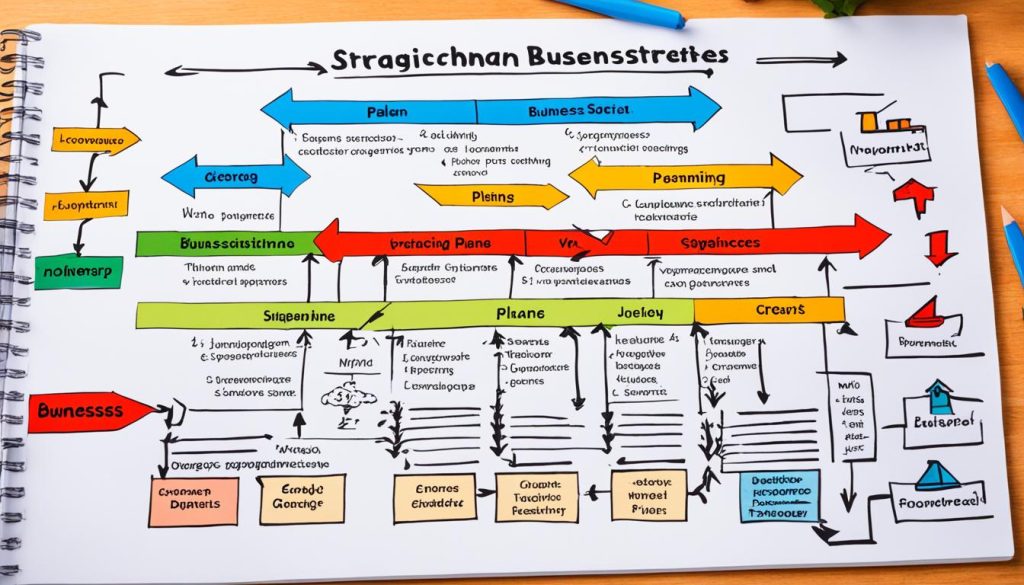A business plan is a strategic tool that outlines a company’s goals and the steps it will take to achieve them. It serves as a roadmap for the organisation, providing clarity on the direction, objectives, and strategies. The business plan helps attract investors and lenders, as well as keeps the executive team focused on the company’s objectives.
In this guide, we will delve into the importance of business plans and explore the key elements that make a strong business plan. Whether you are a startup seeking funding or an established company looking to stay on track, this guide will provide you with valuable insights and tips for crafting an effective business plan. Let’s dive in and discover how a well-crafted business plan can set your business up for success.
What is a Business Plan and Its Importance?
Business plans play a crucial role in the success of both startups and established companies alike. For startups, a well-crafted business plan is essential for securing funding and attracting investors. It serves as a comprehensive guide that helps potential lenders and investors understand the viability of the business and its potential for success. Additionally, a business plan keeps the executive team focused on the company’s short-term and long-term objectives, ensuring that the business stays on track and remains aligned with its goals.
When it comes to securing funding, a solid business plan is a vital tool that showcases the company’s vision, mission, market analysis, marketing strategy, and financial projections. It provides potential investors with a clear roadmap, demonstrating how their investment will contribute to the growth and profitability of the business. A well-developed business plan significantly increases the chances of attracting the necessary capital for startup ventures.
Furthermore, for established companies, a business plan serves as a strategic tool to evaluate the current state of the business and outline future strategies for growth and sustainability. It acts as a reference document that ensures all stakeholders understand the company’s objectives, initiatives, and the actions required to achieve them. By regularly reviewing and updating the business plan, companies can adapt to changes in the market, identify new opportunities, and maintain a competitive edge.
Benefits of a Business Plan:
- Securing funding and attracting investors
- Guiding the executive team and staying focused on objectives
- Evaluating the viability and potential of the business
- Creating a roadmap for growth and profitability
- Identifying new opportunities and adapting to market changes

| Startups | Established Companies |
|---|---|
| Secures funding and attracts investors | Gathers insights for evaluating the current state of the business |
| Demonstrates the viability and potential of the business | Outlines future strategies for growth and sustainability |
| Keeps the executive team focused on objectives | Acts as a reference document for all stakeholders |
By understanding the importance of business plans and leveraging their benefits, both startups and established companies can confidently navigate the dynamic business landscape and unlock their full potential.
Elements of a Strong Business Plan
A strong business plan is essential for guiding the success of a company. It comprises several key elements that provide a comprehensive understanding of the business and its potential. By including these elements, entrepreneurs can communicate their vision, strategy, and financial feasibility effectively. Let’s explore the critical components that form a robust business plan:
1. Executive Summary
The executive summary serves as an overview of the entire business plan. It concisely presents the business’s mission, objectives, and unique selling proposition (USP). This section provides a snapshot of the business and entices readers to continue exploring the plan.
2. Products or Services Description
This element delves into the details of the products or services offered by the business. It highlights the features, benefits, and competitive advantages that differentiate the offerings in the market. Clearly articulating the value proposition is crucial for attracting customers and investors.
3. Market Analysis
A comprehensive market analysis demonstrates a deep understanding of the industry and target market. This section includes an examination of market trends, customer preferences, and competitive landscape. Conducting thorough market research enables businesses to identify opportunities, anticipate challenges, and position themselves strategically.

4. Marketing Strategy
The marketing strategy outlines how a business plans to reach and engage its target market. It includes a clear description of the target audience, effective promotional tactics, and a pricing strategy that reflects the value proposition. A strong marketing strategy ensures that the business captures customers and maintains a competitive edge.
5. Financial Projections
Financial projections demonstrate the financial viability and potential profitability of the business. This section includes forecasts for revenue, expenses, cash flow, and profitability over a specified period. It provides insights into the expected return on investment (ROI) and helps investors assess the financial sustainability of the business.
By incorporating these key elements into a business plan, entrepreneurs can create a strong foundation for their venture. Additionally, using a business plan template offers a helpful starting point, ensuring that all essential information is included and organized effectively.
Types of Business Plans
When creating a successful business plan, it’s important to understand the different types of business plans available. Each type serves a specific purpose and requires a tailored approach to effectively meet the company’s needs.
Internal Business Plans
Internal business plans are primarily used for internal decision-making and guidance within the company. These plans focus on outlining strategies, goals, and operational processes that will drive the organization forward. They provide a roadmap for the executive team to follow, ensuring that the company remains aligned with its objectives.
External Business Plans
External business plans are designed to attract external stakeholders such as investors and lenders. These plans aim to showcase the company’s market potential, growth opportunities, and financial projections. They include comprehensive market analysis, competitive strategies, and a clear value proposition to entice potential investors into supporting the business.
Growth Plans
Growth plans are specifically tailored to companies looking to expand their operations. These plans outline the strategies and actions required to achieve significant growth in terms of market share, product lines, or geographical reach. Growth plans typically include market research, expansion strategies, and financial forecasts to demonstrate the viability and potential return on investment.
Operational Plans
Operational plans focus on the day-to-day activities and processes of a business. These plans provide detailed guidance on how the company will operate efficiently and effectively to achieve its goals. They often include information on organizational structure, staffing plans, production processes, and supply chain management.
By understanding the different types of business plans and their specific requirements, entrepreneurs can create tailored and successful plans that address their company’s unique needs and objectives.

Crafting an Effective Business Plan
Crafting an effective business plan requires careful consideration and a structured approach. A well-structured business plan not only serves as a roadmap for your business but also communicates your vision and strategies to potential investors and partners.
Business Plan Structure
A well-structured business plan typically includes the following sections:
- Executive Summary: A concise overview of your business, highlighting key points and objectives.
- Company Overview: Provides detailed information about your company, including its mission, vision, and values.
- Market Analysis: Examines your target market, competition, and industry trends to identify opportunities and challenges.
- Marketing Strategy: Outlines your marketing efforts, including your target audience, pricing, distribution, and promotional strategies.
- Operations and Management: Describes your organizational structure, key team members, and operational processes.
- Financial Projections: Presents your financial forecasts, including sales projections, income statements, and cash flow analysis.
- Appendices: Includes any additional information or supporting documents, such as market research data or resumes of key team members.
By following this structure, your business plan will flow smoothly, providing a comprehensive view of your business and its potential for success.
What to Include in a Business Plan?
To create a compelling business plan, make sure to include the following key elements:
- Business model: Clearly define how your business generates revenue and sustains profitability.
- Target market: Identify your ideal customer profile and demonstrate a deep understanding of their needs and preferences.
- Competitive analysis: Assess your competition and highlight what sets your business apart.
- Strategies for growth and sustainability: Outline your plans for expansion, innovation, and long-term success.
- Real-life examples and case studies: Include relevant success stories and illustrate how your business solves problems or meets market demands.
By incorporating these elements, you will create a comprehensive and persuasive business plan that showcases the potential of your venture.

The visual image above illustrates the typical structure of a business plan, highlighting each section’s importance. It’s essential to follow this structure while customizing it to reflect your unique business and goals.
Conclusion
In conclusion, a business plan is a strategic document that outlines a company’s objectives and the strategies it will use to achieve them. It serves as a roadmap for the organization, providing clarity and direction. Whether you are a startup seeking funding or an established company aiming to stay focused on your goals, a well-crafted business plan is essential.
A business plan acts as a guide, keeping the executive team on track and ensuring that the business stays aligned with its objectives. It also plays a crucial role in attracting investors and lenders, as it demonstrates the viability and potential for success of the business. By including the necessary elements in your business plan, such as the company’s mission and vision, market analysis, marketing strategy, and financial projections, you can provide a clear roadmap for the future.
To create an effective business plan, it is important to follow a structured and comprehensive approach. Conduct thorough research, plan carefully, and communicate your ideas clearly. Consider including real-life examples and case studies to make your business plan more impactful and persuasive. By doing so, you can increase your chances of success and secure your position in the market.
FAQs
What are the 4 main parts of a business plan?
A business plan typically consists of an executive summary, a company description, a market analysis, and a financial plan detailing the business’s goals, strategies, target market, and financial projections.
What is in a simple business plan?
A basic business plan includes an overview of the business, a description of products or services, market analysis, marketing strategies, operational details, and financial projections.
How to draw up a business plan
To create a business plan, outline your business concept, research the market and competition, define your target audience, establish financial projections, and detail strategies for operations and growth.
What is a business plan for a startup?
A startup business plan outlines the company’s vision, mission, target market, competition analysis, marketing strategies, operational plans, and financial forecasts to guide the business towards success and growth.





